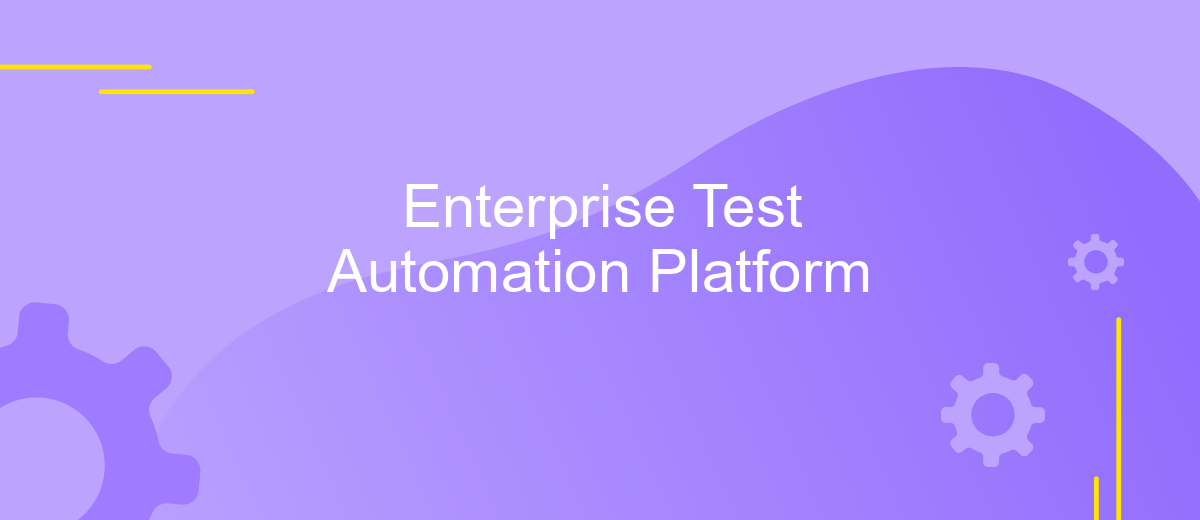Enterprise Test Automation Platform
In today's fast-paced digital landscape, enterprises are under constant pressure to deliver high-quality software at an accelerated pace. An Enterprise Test Automation Platform emerges as a crucial solution, enabling organizations to streamline their testing processes, enhance accuracy, and reduce time-to-market. By integrating advanced automation tools, businesses can ensure robust software performance, scalability, and reliability, ultimately driving innovation and maintaining a competitive edge.
Introduction
In today's fast-paced digital landscape, enterprises are increasingly turning to test automation platforms to enhance their software development processes. These platforms offer a comprehensive solution for automating testing tasks, ensuring that software products meet quality standards and are delivered on time. By integrating test automation into their workflows, organizations can achieve greater efficiency and accuracy, reducing the time and resources required for manual testing.
- Accelerated testing cycles and faster time-to-market.
- Improved test coverage and reliability.
- Reduced human error and increased consistency in test execution.
- Enhanced collaboration among development and testing teams.
- Scalability to accommodate growing testing needs.
As enterprises strive to remain competitive, adopting a robust test automation platform becomes essential. These platforms not only streamline the testing process but also provide valuable insights through analytics and reporting. By leveraging the capabilities of test automation, organizations can focus on innovation and strategic growth, while ensuring that their software products are of the highest quality. With the right platform, businesses can transform their testing operations, driving efficiency and excellence in software delivery.
Benefits of an Enterprise Test Automation Platform

Implementing an Enterprise Test Automation Platform offers significant benefits for organizations looking to enhance their software development processes. Primarily, it increases efficiency by automating repetitive and time-consuming testing tasks, allowing developers and testers to focus on more complex issues. This leads to faster release cycles, reduced time-to-market, and improved software quality. Additionally, an automation platform ensures consistency in testing, minimizing human error and providing reliable results that boost confidence in the product's stability and performance.
Another key advantage is the ability to integrate seamlessly with other tools and systems within the enterprise ecosystem. Platforms like ApiX-Drive facilitate these integrations, enabling smooth data flow and communication between different applications. This interconnectedness not only streamlines workflows but also enhances collaboration across teams. Furthermore, a robust test automation platform can scale effortlessly to accommodate growing project demands, making it a future-proof investment. Ultimately, adopting such a platform empowers organizations to deliver high-quality software efficiently and consistently, meeting customer expectations and staying competitive in the market.
Key Features and Capabilities

Enterprise Test Automation Platforms are essential tools for modern businesses aiming to streamline their software testing processes. These platforms offer a comprehensive suite of features designed to enhance efficiency, reduce manual intervention, and ensure high-quality software delivery. By leveraging advanced automation capabilities, organizations can significantly cut down on testing time while maintaining robust test coverage.
- Scalability: Easily handle large volumes of tests across multiple environments.
- Integration: Seamlessly connect with popular CI/CD tools and development environments.
- AI-driven Testing: Utilize machine learning algorithms to optimize test cases and predict potential failures.
- Cross-Platform Support: Execute tests on various devices, browsers, and operating systems.
- Comprehensive Reporting: Generate detailed insights and analytics to track test performance and outcomes.
With these key features, an Enterprise Test Automation Platform empowers teams to focus on innovation rather than repetitive testing tasks. The integration of AI and machine learning further enhances the platform's capabilities, allowing for smarter and more efficient test execution. As a result, businesses can accelerate their release cycles, improve software quality, and achieve greater customer satisfaction.
Implementation and Best Practices

Implementing an Enterprise Test Automation Platform demands a strategic approach to ensure seamless integration and maximum efficiency. Initially, it's crucial to assess the existing infrastructure and identify the specific needs of your organization. This involves evaluating current testing processes and determining which areas would benefit most from automation.
Once the needs are identified, selecting the right tools and technologies becomes paramount. The chosen platform should align with the organization's goals and be scalable to accommodate future growth. It's also essential to ensure that the platform supports various testing types, including functional, performance, and security testing.
- Conduct a pilot program to validate the platform's effectiveness.
- Train the team thoroughly to maximize the platform's potential.
- Establish clear metrics to measure success and areas for improvement.
- Integrate the platform with existing CI/CD pipelines for continuous testing.
Regularly reviewing and updating the test automation strategy is vital to adapt to evolving business needs. By following these best practices, organizations can enhance their software quality and accelerate delivery timelines, ultimately achieving a competitive edge in the market.
Conclusion
In conclusion, the implementation of an Enterprise Test Automation Platform is a pivotal step for organizations aiming to enhance software quality and accelerate delivery cycles. This platform serves as a comprehensive solution, integrating multiple testing tools and frameworks to provide a unified testing environment. By automating repetitive and complex testing processes, organizations can significantly reduce manual effort, minimize human error, and ensure consistent test coverage across all software components.
Furthermore, the integration capabilities of platforms like ApiX-Drive can streamline the process by seamlessly connecting with various enterprise applications and services. This allows for a more cohesive workflow, enabling teams to focus on strategic tasks rather than operational bottlenecks. As enterprises continue to evolve in their digital transformation journeys, adopting a robust test automation strategy is not just beneficial but essential. It ensures that businesses remain competitive, agile, and capable of meeting the ever-growing demands of the technology landscape.
FAQ
What is an Enterprise Test Automation Platform?
How can test automation benefit my organization?
What types of tests can be automated on this platform?
How can I integrate test automation with my existing tools and workflows?
What are the key features to look for in an Enterprise Test Automation Platform?
Apix-Drive is a simple and efficient system connector that will help you automate routine tasks and optimize business processes. You can save time and money, direct these resources to more important purposes. Test ApiX-Drive and make sure that this tool will relieve your employees and after 5 minutes of settings your business will start working faster.

